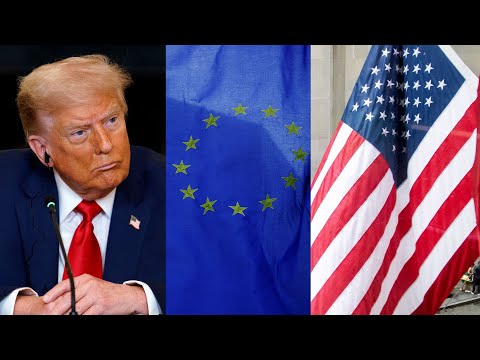Kriti Gupta, host of Bloomberg’s "The Opening Trade," discusses the EU-US trade agreement and its global implications.
European capitals defended the trade deal struck with President Donald Trump, which will see the European Union accept a 15% tariff on most of its exports to the US while reducing levies on some American products to zero.
European Commission President Ursula von der Leyen, who met with Trump in his golf club in Turnberry, Scotland, on Sunday, hailed the agreement for the stability and predictability it will offer businesses and consumers. The EU knew that the deal would favor the US, but von der Leyen urged reporters to “not forget where we came from,” referencing tariff rates Trump threatened that were as high as 50%.
Read More: Merz and Macron Just Didn’t Want to Risk a Trade War With Trump
The lower rate came as a relief to member states that are dependent on exports, especially Germany, which exported $34.9 billion of new cars and auto parts to the US in 2024.
“The agreement has succeeded in averting a trade conflict that would have hit the export-oriented German economy hard,” German Chancellor Friedrich Merz said in a statement late Sunday. “This has enabled us to safeguard our core interests, even if I would have liked to have seen further easing in transatlantic trade.”
Without a deal, Bloomberg Economics estimated that the total US average effective tariff rate would rise to nearly 18% on Aug. 1 from 13.5% under current policies. The new deal brings that number down to 16%.
Prior to Trump’s latest trade fight, the EU estimated the average tariff rate to be about 1% on both sides.
The euro dropped the most in over two months against the dollar, falling as much as 1% to $1.1626 on Monday. That’s the biggest drop since May 12 and makes the euro the worst performer in a basket of major currencies.
Read More: European Stocks Erase Gain as Autos Decline on Tariff Jitters
Industry officials in Germany have warned that the deal leaves the auto industry exposed and will make companies in Europe less competitive.
“The agreement is an inadequate compromise and sends a disastrous signal to the closely intertwined economies on both sides of the Atlantic,” said Wolfgang Niedermark, a member of the executive board of Germany’s BDI industry federation. “The EU is accepting painful tariffs. Even a 15% tariff will have immense negative consequences for Germany’s export-oriented industry.”
——–
More on Bloomberg Television and Markets
Like this video? Subscribe and turn on notifications so you don’t miss any videos from Bloomberg Markets & Finance: https://tinyurl.com/ysu5b8a9
Visit http://www.bloomberg.com for business news & analysis, up-to-the-minute market data, features, profiles and more.
Connect with Bloomberg Television on:
X: https://twitter.com/BloombergTV
Facebook: https://www.facebook.com/BloombergTelevision
Instagram: https://www.instagram.com/bloombergtv/
Connect with Bloomberg Business on:
X: https://twitter.com/business
Facebook: https://www.facebook.com/bloombergbusiness
Instagram: https://www.instagram.com/bloombergbusiness/
TikTok: https://www.tiktok.com/@bloombergbusiness?lang=en
Reddit: https://www.reddit.com/r/bloomberg/
LinkedIn: https://www.linkedin.com/company/bloomberg-news/
More from Bloomberg:
Bloomberg Radio: https://twitter.com/BloombergRadio
Bloomberg Surveillance: https://twitter.com/bsurveillance
Bloomberg Politics: https://twitter.com/bpolitics
Bloomberg Originals: https://twitter.com/bbgoriginals
Watch more on YouTube:
Bloomberg Technology: https://www.youtube.com/@BloombergTechnology
Bloomberg Originals: https://www.youtube.com/@business
Bloomberg Quicktake: https://www.youtube.com/@BloombergQuicktake
Bloomberg Espanol: https://www.youtube.com/@bloomberg_espanol
Bloomberg Podcasts: https://www.youtube.com/@BloombergPodcasts



